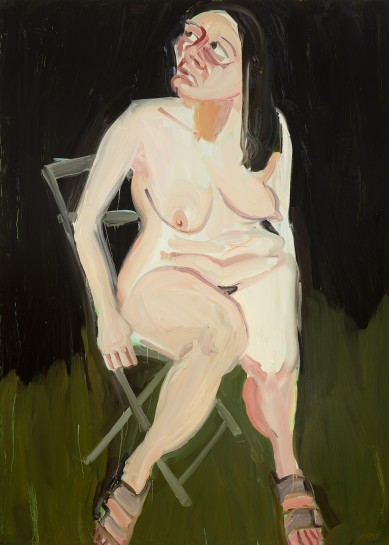
Chantal Joffe and Tal R in Human Condition at the former Los Angeles Metropolitan Medical Center
Human Condition (1 October - 30 November 2016) is an immersive, site-specific exhibition that features the work of over eighty emerging and established artists in a uniquely challenging space: a former hospital in West Adams, previously known as the Los Angeles Metropolitan Medical Center. Curated and produced by the Los Angeles-based art advisor John Wolf, Human Conditioninvites artists to re-contextualize the hospital’s functional history—over 40,000 square feet of it—as a venue to explore what it means to be human. The exhibition opens to the public on October 1, 2016 and runs through November 30, 2016.
The Los Angeles Metropolitan Medical Center proudly opened in 1971 as the first Black-owned hospital in Los Angeles. It operated successfully for decades. Later, both the hospital and the West Adams neighborhood in which it was located declined; in the hands of the Pacific Health Corp, the hospital closed amid revelations of criminal mismanagement and insurance fraud in 2013.
Years of neglect are now giving way to reinvestment in West Adams, which hosts much of the city’s cherished architectural heritage and landmarks. It is now home to many working artists, a burgeoning art scene, and other signs of community-driven cultural renewal.
With Human Condition, Wolf has invited artists to explore the corporal and psychological experience of being human. Ranging from sculpture, drawing, painting, performance, and immersive installations, the works are displayed amongst the surgical rooms, maternity wards, a psychiatric floor, and cafeteria. Both the artist and viewer are encouraged to explore the dilapidated remains and transcend the building’s original intention.
Many of the artists have taken over entire hospital rooms for solo presentations and site specific installations, with the two main floors of the exhibition divided in approach to human condition. The subconscious mind is addressed on the first floor by artists Jenny Holzer, David Benjamin Sherry, Gregory Crewdson, and Chantal Joffe, among others. The hospital’s rooftop billboard, which once read “The Los Angeles Metropolitan Medical Center,” now reads “Flesh and Bone Zone” in a gradient of flesh colors—the work of artist Kelly Lamb. Upon entry, Jenny Holzer’s engraved white granite bench “What a show when they tell you it won’t hurt…,” 1989, succinctly sets the tone for psychological tour de force ahead.
The conscious, decision-making mind is explored on the second floor by Laurent Grasso, Polly Borland, Matthew Day Jackson, and Marc Horowitz, to name a few. Here, the surgery rooms host sculptural work by Daniel Arsham, Matthew Day Jackson, Tony Matelli, and Nick van Woert, while Polly Borland’s “Babies” series hangs in the cheerful pediatric ward. The juxtapositions range from uncanny to twisted. Before climbing to the fourth floor psychiatric ward, guests are invited to put up their feet: In an ironic nod to a human need for comfort, the otherwise sterile ICU has been repurposed as a waiting room with furniture from the Haas Brothers, Jeff Zimmerman, James Magni, Kerry Joyce, and Holly Hunt.
Human Condition is a unique opportunity to experience artwork outside the confines of a typical art space. In using the skeletal remains of the hospital and its discarded medical supplies, artists and viewers are encouraged to explore the notion of what we leave behind—from objects to human history.
Image: Chantal Joffe, Self-Portrait in the Garden at Night, 2016.
- Doug Aitken
- Njideka Akunyili Crosby
- Milton Avery
- Jules de Balincourt
- Ali Banisadr
- Hernan Bas
- María Berrío
- Saskia Colwell
- Verne Dawson
- Stan Douglas
- Elmgreen & Dragset
- Inka Essenhigh
- Ian Hamilton Finlay
- David Harrison
- NS Harsha
- Alex Hartley
- Secundino Hernández
- Ilse D’Hollander
- Christian Holstad
- Kudzanai-Violet Hwami
- Chantal Joffe
- Isaac Julien
- Idris Khan
- Yayoi Kusama
- John Kørner
- Doron Langberg
- Wangechi Mutu
- Alice Neel
- Maria Nepomuceno
- Chris Ofili
- Jorge Pardo
- Celia Paul
- Grayson Perry
- Paula Rego
- Tal R
- Conrad Shawcross
- Hedda Sterne
- Do Ho Suh
- Sarah Sze
- Adriana Varejão
- Stephen Willats
- Flora Yukhnovich
- Doug Aitken
- Njideka Akunyili Crosby
- Milton Avery
- Jules de Balincourt
- Ali Banisadr
- Hernan Bas
- María Berrío
- Saskia Colwell
- Verne Dawson
- Stan Douglas
- Elmgreen & Dragset
- Inka Essenhigh
- Ian Hamilton Finlay
- David Harrison
- NS Harsha
- Alex Hartley
- Secundino Hernández
- Ilse D’Hollander
- Christian Holstad
- Kudzanai-Violet Hwami
- Chantal Joffe
- Isaac Julien
- Idris Khan
- Yayoi Kusama
- John Kørner
- Doron Langberg
- Wangechi Mutu
- Alice Neel
- Maria Nepomuceno
- Chris Ofili
- Jorge Pardo
- Celia Paul
- Grayson Perry
- Paula Rego
- Tal R
- Conrad Shawcross
- Hedda Sterne
- Do Ho Suh
- Sarah Sze
- Adriana Varejão
- Stephen Willats
- Flora Yukhnovich
Victoria Miro Venice
San Marco 1994,
Calle Drio La Chiesa
30124 Venice, Italy
t: +39 041 523 3799
info@victoria-miro.com
View map
Opening Times
During exhibitions:
London: Tuesday–Saturday: 10am–6pm.
Venice: Tuesday–Saturday: 10am–1pm & 2–6pm.
We are also closed on Sundays, Mondays and public holidays.
Admission free.
Enquiries
All general enquiries should be sent to
info@victoria-miro.com
Victoria Miro does not accept unsolicited artist applications.
Before contacting or subscribing please read our Privacy Policy
We respect the choices you make about how you would like to hear from us. You will find links at the bottom of all emails we send from our mailing list which allow you to Update your preferences to change the way we contact you, or Unsubscribe if you want to opt out.
Read our Modern Slavery Statement here.
Read our sustainability statement here.
Subscribe
Staff contact details
Directors
Sales
Exhibitions
Communications
Operations
Technical Services
Finance
This website uses cookies
This site uses cookies to help make it more useful to you. Please contact us to find out more about our Cookie Policy.